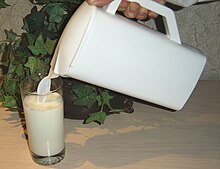Milk bag: Difference between revisions
m Reverted edits by 75.94.232.83 (talk) to last revision by Bongwarrior (HG) |
→Benefits: Nowhere in the referenced article does it state what material milk bags are made of, nor does it state that they are recyclable. |
||
| Line 14: | Line 14: | ||
[[Image:Milk Pitcher With Lid.jpg|thumb|left|Milk pitcher with lid]] |
[[Image:Milk Pitcher With Lid.jpg|thumb|left|Milk pitcher with lid]] |
||
Milk bags use less plastic than traditional milk jugs and are placed in reusable plastic pitchers.{{Vague|date=June 2010}} |
Milk bags use less plastic than traditional milk jugs and are placed in reusable plastic pitchers.{{Vague|date=June 2010}} |
||
== Drawbacks == |
== Drawbacks == |
||
Revision as of 10:16, 9 June 2011
This article needs additional citations for verification. (April 2009) |

Milk bags are plastic bags that hold milk. They are usually stored in a pitcher or jug with one of the corners cut off to allow for pouring. A typical milk bag contains approximately 1 1/3 litres of milk.
Popularity

Milk bags are common in several countries and regions of the world, including Argentina, Bolivia, Brazil, Canada, Nicaragua, Honduras, China, Colombia, Estonia, Hungary, India, Iran, Israel, Montenegro, Poland, South Africa and Uruguay. They were also common in Bulgaria and other Balkan countries during the Soviet bloc period, but their popularity diminished in subsequent years.[when?] Declining popularity in this region is attributed to the lower shelf appeal of the milk bags compared to others emerging at the time such as Tetra Pak and plastic bottles.[citation needed] A resurgence of milk bags is beginning in Britain amid concerns that plastic bottles aren't being recycled. Milk bags were also used in Australia (Greater Shepparton, Victoria), in the late 1990s, distributed by Shepparton-based dairy company Ducats. Some dairies in the United States used the bags in the 1980's, but today are confined mainly to regional convenience store chains with in-house dairies such as Kwik Trip in the Upper Midwest and other boutique dairies.
In the United Kingdom, Sainsburys began a pilot experiment on distributing milk in bags in 2008 in conjunction with Dairy Crest.[1] It was originally targeted at 35 stores at the same price as a regular 2-imperial-pint (1.1 L) plastic bottle of milk,[2] the product was expanded nationwide in 2010 at which point the bags retailed at a discounted price compared to traditional containers.[3]
Benefits

Milk bags use less plastic than traditional milk jugs and are placed in reusable plastic pitchers.[vague]
Drawbacks

Milk bags sometimes puncture or burst and are weaker than milk jugs and have thin linings. When pouring, the top of the bag can also topple over, causing the milk to spill. This can be avoided by cutting a secondary hole at the other side of the bag for air intake, by pinching the top of the bag while pouring, or by using a pitcher with a lid to keep the milk bag in place. Milk bags cannot be sealed once open, although some consumers fold over the spout and use clips to help maintain freshness.
See also
References
- ^ Blades, Hollye (2008-06-09). "Pinta goes green as supermarkets offer shoppers the chance to buy milk in a bag". The Times. London.
- ^ Neate, Rupert (2008-06-09). "Milk in bags hits Sainsbury's shelves". The Daily Telegraph. London.
- ^ Wallop, Harry (2010-02-24). "Milk in a bag at Sainsbury's". The Daily Telegraph. London.
